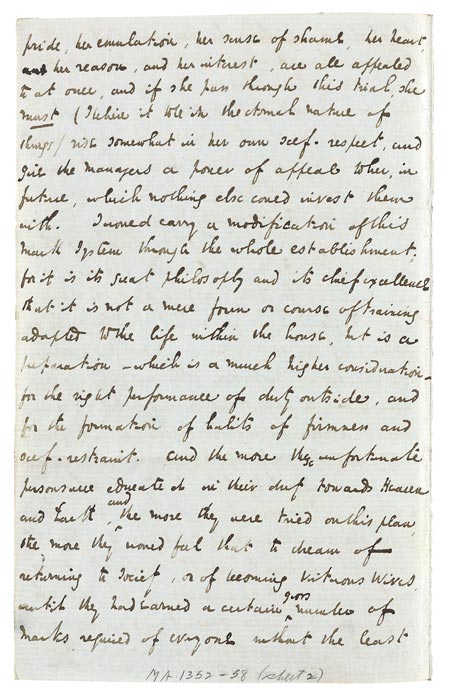
This letter is the earliest in which Dickens makes reference to the project to create a home for prostitutes and petty miscreants that would become Urania Cottage. Dickens's fourteen-page letter sets out in detail his hopes and plans for the institution: "A woman or girl coming to the Asylum, it is explained to her that she has come there for useful repentance and reform, and because her past way of life has been dreadful in its nature and consequences, and full of affliction, misery, and despair to herself. Never mind Society while she is at that pass. Society has used her ill and turned away from her, and she cannot be expected to take much heed of its rights or wrongs." Dickens never used the term prostitute in any of his letters.
Philanthropy
From 1840 Dickens guided the charitable work of philanthropist Angela Burdett-Coutts (1814–1906), the wealthiest heiress in Victorian Britain. Dickens served as her official almoner and helped to assess the merits of the thousands of letters she received from those seeking financial assistance. He also advised on her plan for improved sanitation in the slums of Westminster and drew her attention and support to the Ragged School Union, which provided education to London's poorest children. A pragmatist, Dickens encouraged Burdett-Coutts to direct her philanthropy toward the causes of distress. In 1847 they founded a home, Urania Cottage, in Shepherd's Bush, as a shelter for homeless women—prostitutes or petty criminals who sought to rehabilitate themselves by learning practical skills and developing self-discipline. Many of the women were assisted to eventually emigrate to one of Britain's colonies to begin a new life. For more than ten years, Dickens administered Urania Cottage on behalf of Burdett-Coutts and played an extremely active role in its day-to-day management.
pride, her emulation, her sense of shame, her heart, her reason, and her interest, are all appealed to at once, and if she pass through this trial, she must (I believe it to be in the eternal nature of things) rise somewhat in her own self-respect, and give the managers a power of appeal to her, in future, which nothing else could invest them with. I would carry a modification of this Mark System through the whole establishment; for it is its great philosophy and its chief excellence that it is not a mere form or course of training adapted to the life within the house, but is a preparation—which is a much higher consideration—for the right performance of duty outside, and for the formation of habits of firmness and self-restraint. And the more these unfortunate persons were educated in their duty towards Heaven and Earth, and the more they were tried on this plan, the more they would feel that to dream of returning to Society, or of becoming Virtuous Wives, until they had earned a certain gross number of Marks required of everyone without the least
